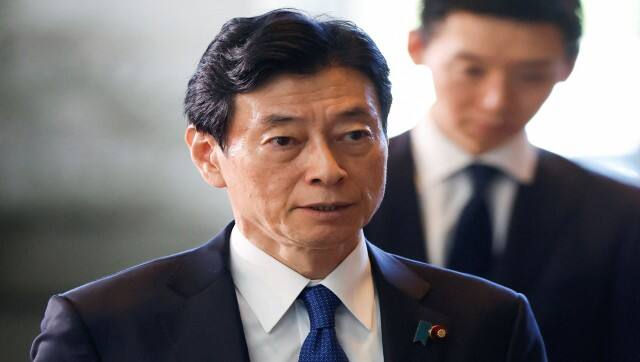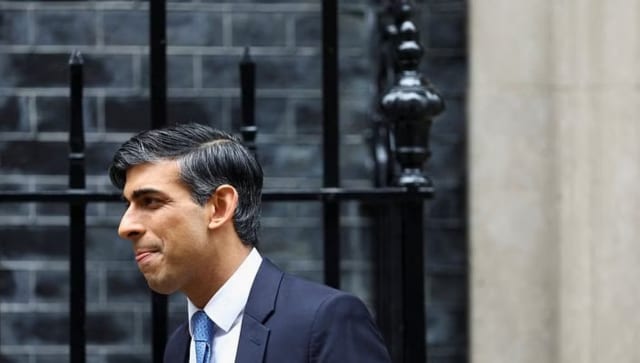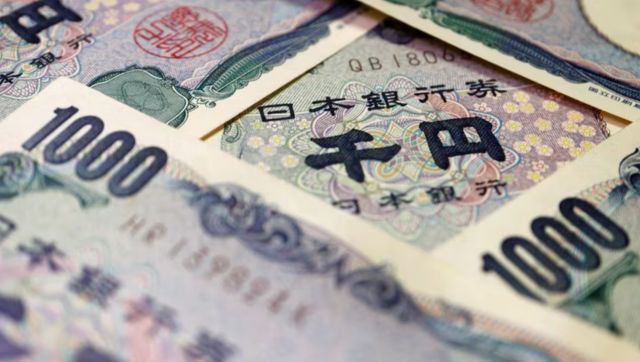Japan has unexpectedly slipped into a recession and has likely lost its position as the world’s largest economy to Germany. This comes after the United Kingdom also dipped into a recession at the end of last year. While there is no legal definition for recession, it is generally understood to have begun after two straight quarters of contraction. But what happened in Japan and the UK? And how could it affect the common man? Let’s take a closer look What happened in Japan? Japan’s gross domestic product (GDP) fell an annualised 0.4 per cent in the October-December period after a 3.3 per cent slump in the previous quarter, government data showed on Thursday. That confounded market forecasts of a 1.4 per cent increase. “What’s particularly striking is the sluggishness in consumption and capital expenditure that are key pillars of domestic demand,” said Yoshiki Shinke, senior executive economist at Dai-ichi Life Research Institute.
“The economy will continue to lack momentum for the time being with no key drivers of growth.”
Japan’s nominal GDP stood at $4.21 trillion in 2023, falling below $4.46 trillion for Germany to rank as the world’s fourth largest economy, the data showed. Speaking to the BBC, economist Neil Newman said this is down to the softness of the Japanese currency against the dollar. Newman added that Japan could take back its spot if the yen recovers. Private consumption, which makes up more than half of economic activity, fell 0.2 per cent, versus market forecasts for a 0.1 per cent gain, as rising living costs and warm weather discouraged households from dining out and buying winter clothes. Capital expenditure, another key private-sector growth engine, fell 0.1 per cent, compared with forecasts of a 0.3 per cent gain.
Both consumption and capital expenditure shrank for the third straight quarter.
Big companies expect to increase capital expenditure by hefty 13.5 per cent in the year ending in March, a quarterly survey showed. But analysts point to a delay in actual investment due to rising raw material costs and labour shortages. The most recent machinery orders data, regarded as a leading indicator of capital spending, showed a contraction in November and cast doubt on the BOJ’s view that robust investment will underpin the economy. External demand, or exports minus imports, contributed 0.2 percentage point to GDP as exports rose 2.6 per cent from the previous quarter. While many analysts still expect the Bank of Japan to phase out its massive monetary stimulus this year, the weak data may cast doubt on its forecast that rising wages will underpin consumption and keep inflation durably around its two per cent target. [caption id=“attachment_13172082” align=“alignnone” width=“640”] Japan’s Minister of Economy, Trade and Industry Yasutoshi Nishimura. Reuters File[/caption] The BOJ has been laying the groundwork to end negative rates by April and overhaul other parts of its ultra-loose monetary framework, but is likely to go slow on any subsequent policy tightening amid lingering risks, sources have told Reuters. “This dire growth picture makes it even more difficult for the BOJ to tighten policy,” Charu Chanana, head of FX strategy at Saxo Markets, was quoted as saying by CNBC. Chanana earlier said the development “weakens the conviction around whether inflation is really driven by a virtuous cycle of increased real income and spending.” “Two consecutive declines in GDP and three consecutive declines in domestic demand are bad news, even if revisions may change the final numbers at the margin,” said Stephan Angrick, senior economist at Moody’s Analytics. What about UK? Meanwhile, the UK’s GDP declined .3 per cent in three months till December, as per The Guardian. That came after a .1 per cent drop in the third quarter. The newspaper quoted the Office For National Statistics’ director of economic statistics Liz McKeown as saying, “Our initial estimate shows the UK economy contracted in the fourth quarter of 2023. While it has now shrunk for two consecutive quarters, across 2023 as a whole the economy has been broadly flat.” “All the main sectors fell on the quarter, with manufacturing, construction and wholesale being the biggest drags on growth, partially offset by increases in hotels and rentals of vehicles and machinery.” Thursday’s data means Britain joins Japan among the Group of Seven advanced economies in a recession, although it is likely to be short-lived and shallow by historical standards. [caption id=“attachment_13702182” align=“alignnone” width=“640”]
Japan’s Minister of Economy, Trade and Industry Yasutoshi Nishimura. Reuters File[/caption] The BOJ has been laying the groundwork to end negative rates by April and overhaul other parts of its ultra-loose monetary framework, but is likely to go slow on any subsequent policy tightening amid lingering risks, sources have told Reuters. “This dire growth picture makes it even more difficult for the BOJ to tighten policy,” Charu Chanana, head of FX strategy at Saxo Markets, was quoted as saying by CNBC. Chanana earlier said the development “weakens the conviction around whether inflation is really driven by a virtuous cycle of increased real income and spending.” “Two consecutive declines in GDP and three consecutive declines in domestic demand are bad news, even if revisions may change the final numbers at the margin,” said Stephan Angrick, senior economist at Moody’s Analytics. What about UK? Meanwhile, the UK’s GDP declined .3 per cent in three months till December, as per The Guardian. That came after a .1 per cent drop in the third quarter. The newspaper quoted the Office For National Statistics’ director of economic statistics Liz McKeown as saying, “Our initial estimate shows the UK economy contracted in the fourth quarter of 2023. While it has now shrunk for two consecutive quarters, across 2023 as a whole the economy has been broadly flat.” “All the main sectors fell on the quarter, with manufacturing, construction and wholesale being the biggest drags on growth, partially offset by increases in hotels and rentals of vehicles and machinery.” Thursday’s data means Britain joins Japan among the Group of Seven advanced economies in a recession, although it is likely to be short-lived and shallow by historical standards. [caption id=“attachment_13702182” align=“alignnone” width=“640”] The development comes as a blow for UK Prime Minister Rishi Sunak. Reuters[/caption] Canada has yet to report GDP data for the fourth quarter. Britain’s economy has been stagnating for nearly two years. The COVID-19 pandemic triggered the deepest contraction on record over two quarters in early 2020 when the economy slumped by 22 per cent. Before that, the global financial crisis sparked a severe recession that lasted just over a year, from the second quarter of 2008 through to the second quarter of 2009. As per Bloomberg, Bank of England Governor Andrew Bailey has talked down the technical recession.
The development comes as a blow for UK Prime Minister Rishi Sunak. Reuters[/caption] Canada has yet to report GDP data for the fourth quarter. Britain’s economy has been stagnating for nearly two years. The COVID-19 pandemic triggered the deepest contraction on record over two quarters in early 2020 when the economy slumped by 22 per cent. Before that, the global financial crisis sparked a severe recession that lasted just over a year, from the second quarter of 2008 through to the second quarter of 2009. As per Bloomberg, Bank of England Governor Andrew Bailey has talked down the technical recession.
He said surveys of 2024 pointed to an ‘upturn.’
Britain’s economy stands just 1 per cent higher than its level of late 2019, before the COVID-19 pandemic struck – with only Germany among G7 countries faring worse. All this comes in the backdrop of this year’s expected election wherein Prime Minister Rishi Sunak has promised to boost growth Sunak promised to get the economy growing as one of his key pledges to voters last year. His Conservative Party has dominated British politics for much of the past seven decades, with a reputation for economic competence. But Labour is now more trusted with the economy, according to opinion polls, opens new tab. British households are due to see their first drop in living standards between one national election and the next since the Second World War, analysts have said. Ruth Gregory, deputy chief UK economist at Capital Economics, said the GDP figures had more political significance than economic, with voters due to elect lawmakers in two constituencies on Thursday. “The news that the UK slipped into technical recession in 2023 will be a blow for the prime minister on a day when he faces the prospect of losing two by-elections,” Gregory said. Finance minister Jeremy Hunt said there were “signs the British economy is turning a corner” and “we must stick to the plan – cutting taxes on work and business to build a stronger economy.” The Opposition Labour Party rejected those claims. “The prime minister can no longer credibly claim that his plan is working or that he has turned the corner on more than 14 years of economic decline under the Conservatives,” Rachel Reeves, Labour’s top economy official, said. Media reports said Hunt was seeking to cut billions of pounds from public spending plans to fund pre-election tax cuts in his budget, if penned in by tight finances. What does this mean for the common man? A recession is bad for the common man. According to BBC, unemployment could increase as companies lay off employees.
Those coming into the work force could have trouble finding employment.
“Others may find it harder to be promoted, or to get big enough pay rises to keep pace with price increases. However, the pain of a recession is typically not felt equally across society, and inequality can increase,” the piece added. The piece said that those living on fixed incomes would face more difficulties particularly if governments pare back spending on public utilities. With inputs from agencies
)